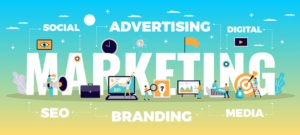In the fast-paced and ever-evolving world of business, digital marketing has emerged as a game-changer, reshaping the way companies connect with their audiences. As consumers increasingly turn to online platforms for information and shopping, the significance of digital marketing cannot be overstated. In this blog, we’ll explore the dynamics of digital marketing, its key components, and the strategies that make it an indispensable tool for businesses in the digital age.
Understanding Digital Marketing:
Digital marketing encompasses a broad range of online activities aimed at promoting products or services, building brand awareness, and driving customer engagement. Unlike traditional marketing methods, digital marketing leverages digital channels such as search engines, social media, email, and websites to reach target audiences. The key advantage lies in its ability to measure and analyze performance in real-time, providing businesses with valuable insights to refine their strategies.
The Pillars of Digital Marketing:
- Search Engine Optimization (SEO): At the heart of digital marketing is SEO, a strategy focused on optimizing a website’s content to rank higher in search engine results. By understanding and incorporating relevant keywords, improving website structure, and creating high-quality content, businesses can enhance their visibility and attract organic traffic.
- Social Media Marketing: Social media platforms have become powerful tools for connecting with audiences and building brand identity. Through targeted content, ads, and engagement strategies, businesses can foster relationships with customers on platforms like Facebook, Instagram, Twitter, and LinkedIn.
- Content Marketing: Content is king in the digital realm. Providing valuable, relevant, and consistent content helps businesses establish authority, engage their audience, and drive conversions. Blog posts, articles, videos, and infographics are just a few examples of content marketing.
- Email Marketing: Despite the rise of various communication channels, email marketing remains a potent tool for nurturing leads and maintaining customer relationships. Personalized and targeted email campaigns can significantly impact customer retention and loyalty.
- Pay-Per-Click (PPC) Advertising: In the world of paid advertising, PPC stands out. Advertisers pay a fee each time their ad is clicked, driving immediate traffic to their websites. Platforms like Google Ads and social media channels offer robust PPC options for businesses.
Strategies for Success:
- Audience Segmentation: Understanding your audience is crucial. Through data analysis and market research, businesses can segment their audience and tailor their marketing strategies to specific demographics, behaviors, and preferences.
- Data Analytics: The power of digital marketing lies in its measurability. By leveraging analytics tools, businesses can track the performance of their campaigns in real-time, allowing for quick adjustments and improvements.
- Mobile Optimization: With the increasing use of smartphones, mobile optimization is no longer optional. Ensuring that websites and content are mobile-friendly is essential for reaching and engaging a broader audience.
- Personalization: Consumers expect personalized experiences. By using data to personalize content and communications, businesses can enhance customer satisfaction and build lasting connections.
In conclusion, digital marketing is a multifaceted approach that empowers businesses to connect with their audience in the digital age. By harnessing the power of SEO, social media, content, email, and paid advertising, businesses can create comprehensive strategies that drive brand awareness, customer engagement, and ultimately, business success. As the digital landscape continues to evolve, businesses must adapt their marketing strategies to stay relevant and competitive in an ever-changing marketplace. Digital marketing isn’t just a tool; it’s a dynamic force reshaping the way we do business in the 21st century.




